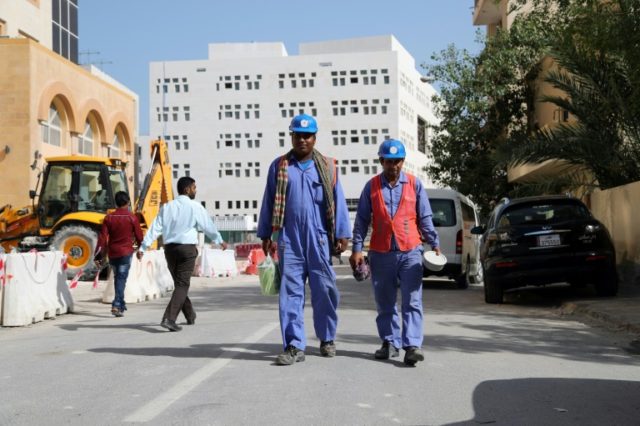Dubai (AFP) – World Cup 2022 host Qatar must urgently introduce laws to protect up to 800,000 migrant construction labourers at risk working in scorching temperatures, Human Rights Watch said Wednesday.
The New York-based organisation also called on the Gulf state to investigate workers’ deaths, their cause, and make those findings public.
“The Qatari authorities’ failure to put in place the most basic protection from the heat, their decision to ignore recommendations that they investigate worker deaths, and their refusal to release data on these deaths, constitutes a wilful abdication of responsibility,” said report author Nicholas McGeehan.
He also called on football’s world governing body, FIFA, national associations and World Cup sponsors to demand further protection from heat and humidity for Qatar’s workers.
McGeehan added: “They should also be demanding answers to two simple questions — how many workers have died since 2012 and how they have died?”
Qatar has introduced laws to stop people working outside between 11:30 am and 3:00 pm annually from June 15 to August 31, when temperatures can reach around 50 degrees Celsius (122 degrees Fahrenheit).
But HRW says these measures do not go far enough.
“Limiting work temperatures to safe temperatures — not set by a clock or calendar — is well within the capacity of the Qatari government and will help protect hundreds of thousands of workers,” said Sarah Leah Whitson, HRW director for the Middle East.
Although it is now outside the months where working restrictions are enforced, temperatures in Qatar remain in the high 30s Celsius and humidity levels are above 50 percent.
The HRW says medical research suggests heat stress is a genuine risk to those working outside.
In rare praise for Qatar’s World Cup organisers, it said the government should follow the example of compulsory work-to-rest ratios introduced for the 12,000 helping build venues for 2022.
“If Qatar’s World Cup organisers can mandate a climate-based work ban, then the Qatar government can follow its lead,” added Whitson.
However, HRW said more change was needed.
It called on the Qatari government and World Cup organisers to introduce the Wet Bulb Global Temperature (WBGT) system which, it said, measures the combined effect of temperature, humidity, wind speed, and solar radiation on humans.
The rights watchdog also called for much greater transparency by Doha on the issue of worker deaths.
It said figures were last made available in 2012.
Out of the 520 deaths then for workers from Bangladesh, India and Nepal, 385, or 74 percent, were “neither explained nor investigated”.
– Qatar refutes claims –
In response, Qatar’s World Cup 2022 organising body, the Supreme Committee for Delivery and Legacy, said it was committed to protecting workers.
“We whole-heartedly refute the suggestion the SC has ‘abdicated responsibility’ or that the SC has failed to protect the lives of workers on our projects,” it said in a statement.
It said it was considering HRW’s recommendations on WBGT, but added it was happy with the measure it uses.
The committee added there had been 11 deaths on World Cup projects — “two work-related fatalities and nine non-work related deaths of workers”.
It said it does not “have the authority or mandate to determine cause of death”.
In addition, Sheikh Saif Al-Thani, director of Qatar’s government communications office, said in a statement: “Qatar is committed to its labour reform programme and is consistently reviewing its policies to ensure that migrant workers receive the necessary on-site protections.”
The 2022 World Cup has been switched from June-July to November-December by FIFA because of concerns about the heat.

COMMENTS
Please let us know if you're having issues with commenting.